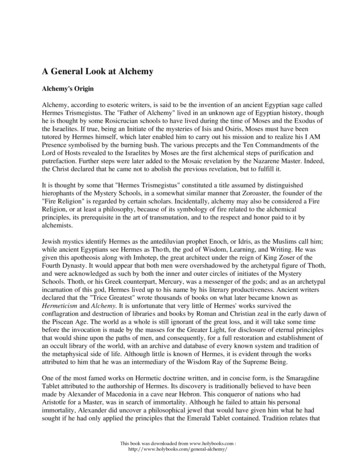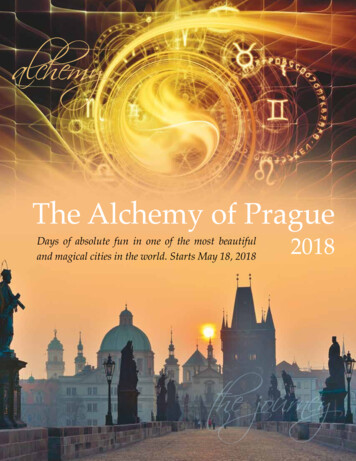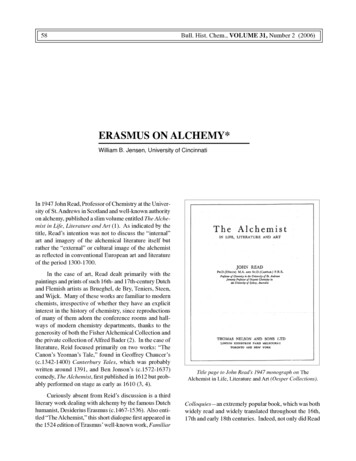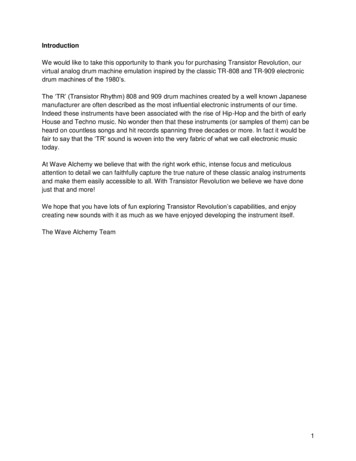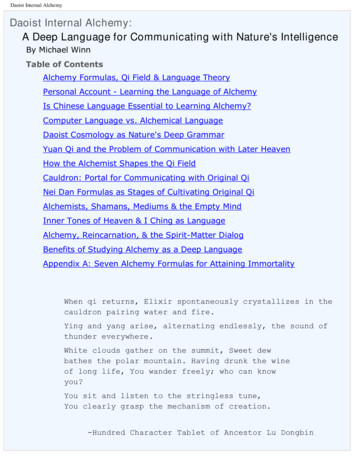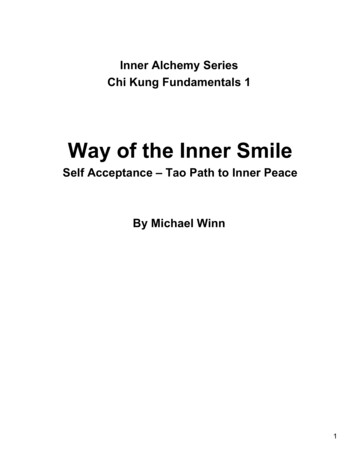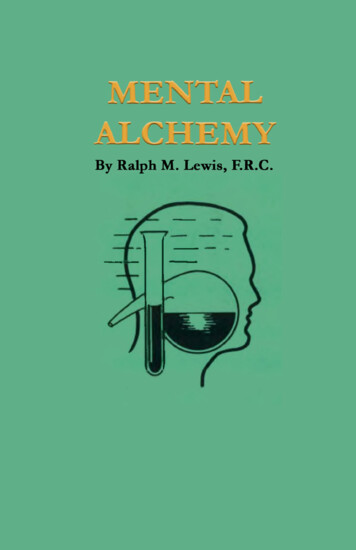
Transcription
MENTAL ALCHEMYby Ralph M. Lewis
1978 and 2015 Supreme Grand Lodge Of The Ancient andMystical Order Rosae Crucis. All Rights Reserved.This publication is for your personal, private use only, and may notbe used for any commercial purpose. No part of this publication maybe reproduced, distributed, displayed, or transmitted in any form or byany means, including photocopying, recording, or other electronic ormechanical means, including information storage and retrieval systems,without the express and prior written permission of Supreme GrandLodge Of The Ancient and Mystical Order Rosae Crucis, except inthe case of brief quotations embodied in reviews. For permissionrequests, please contact: Supreme Grand Lodge Of The Ancient AndMystical Order Rosae Crucis, Inc., Rosicrucian Park, 1342 Naglee Ave,San Jose, California 95191.The information in this book is distributed on an “as is” basis,without warranty. Although every precaution has been taken in thepreparation of this work, neither the author nor the publisher shallhave any liability to any person or entity with respect to any loss ordamage caused or alleged to be caused directly or indirectly by theinformation contained in this book.
DEDICATIONToMy WifeWhose encouragement and support inmany ways made this work possible.R.M.L
ACKNOWLEDGEMENTI am greatly indebted in the preparation of this work to the splendidtyping and organizing assistance of my secretaries, Alene Simonich,Anita Prater, and Michelle Ziebel.I also express appreciation of the proofreading and editingsuggestions of Ruth Phelps.RALPH M. LEWISApril 1978
CONTENTSIntroduction1.Was There a Beginning?2.Is God an Energy?3.Body, Mind, Soul4.Are Good and Evil Absolute?5.Is Consciousness Universal?6.What is Psychic Development?7.Intuition, Idealism, and Illumination8.Creativity—It’s Mystery and Mechanism9.Applying Creativity to your Environment10.The Nature of Value11.What is Positive Thinking?12.What is Self-Mastery?13.Mysticism—A Way of Life14.Suggestion to the Inner Self15.What is Transcendental Meditation?16.Willing Oneself to Relax17.Interpreting Cosmic Guidance18.Our Mission in Life19.Cosmic Ethics20.Mysteries of Psychic Phenomena21.Reincarnation—Fact or Fancy?22.Metaphysics and Science23.What Constitutes Progress?24.How Should We Regard Death?—6—
INTRODUCTIONWHAT IS LIFE all about? What is the real, which of ourthoughts are reality? Our minds ever go through a process ofmental alchemy. Our experiences are constantly transmutingformer ideas into new concepts. But which are the true guides in life, theformer beliefs, traditional ideas, or the new conclusions we personallyarrive at? In the final analysis our view of life, what we expect of it, isa personal construct. We have a better chance of shaping our existenceinto a happy state if we do not try to avoid the puzzling questionswhich life brings forth. How should we confront these mysteries of theself and its relation to all else which the self confronts?What we believe is as important a motivating factor in the courseof our lives as what we know. In fact, many of the thoughts bywhich we shape our lives are abstract. They are what we believe butwhich have not yet been experienced and perhaps cannot be. What ispresented in the following chapters are those ideas that in some formor manner eventually come to the attention of most everyone. Thepresentation may not have the reader’s acceptance but we hope it willcause him to think seriously about the so-called “mysteries of life.”Accepting just the traditional explanations often restricts thought andcauses misconceptions leading to pitfalls of error and their adverseconsequences. However, is the reliance which we place upon ourbeliefs always justified? Do we resort to beliefs as the substitution forknowledge? It behooves us to give thought, especially in this day andage, to the nature of belief. We should learn of any distinction that mayexist between beliefs and points of knowledge. Why do we say, forexample, “I believe in life after death,” instead of declaring, “I know.”In fact, why do we say that we believe anything rather than affirmingour knowledge of it?—7—
MENTAL ALCHEMYBelief is an assumption of knowledge. Knowledge, in contrast tobelief, is experience. Knowledge is empirically realized, that is, it isobjectively perceived. If, for example, we hear a pattering noise onthe windowpane, we may say, “I believe it is raining.” We say believebecause we have not directly perceived the rain. Previous experiencetells us that the noise we hear could be from other sources, so we say“believe.” We are thus assuming a knowledge.Are we then to presume that knowledge is only that which isexperienced through our receptor senses? Suppose we have a problem.It consists of several elements. The elements of the problem are facts.They are that which has been experienced. We, therefore, call thempoints of knowledge. However, it is necessary for us to relate theminto a satisfactory and useful order. We turn these ideas over and overin our minds, seeking a solution. We exercise our reason to do so.Finally we arrive at a solution. The problem seems to be solved, so itappears self-evident to us. We have no further doubt about it.But can we call the solution we arrived at knowledge? Or are theconclusions of our reasoning not equal to what we objectivelyexperience? A vast majority of our thoughts, the result of ourreasoning, we have come to refer to as our beliefs. It is because we cometo realize that our private judgments are subjective in nature, in contrastto experience. In other words, we have come to distinguish betweenthe ideas we form on the one hand and our perceptual knowledge—the result of our senses—on the other. The ideas of reason, of course,are something that is known to us. Such ideas exist in consciousness,but they do not have any counterpart, anything that exactly representsthem, outside of our minds. Perceptual knowledge, however, is thatwhich can be perceived by the senses of anyone. Anyone may see, hear,feel, taste, or smell that which is perceptual knowledge. It is somethingthat may be realized immediately without reasoning about it.Let us use an analogy for better understanding. For a long time peoplethought that a heavy object would fall faster than a lighter one. Theymost assuredly thought that a stone always falls faster than a feather.This idea was accepted as knowledge. It took Galileo to demonstratethat objects fall alike when they are not impeded by air; actually, a—8—
MENTAL ALCHEMYfeather and a lead pellet will fall the same in a vacuum. Galileo’sdemonstration constituted perceptual knowledge. It was something thatwas a matter of common observation that could be proved to all.I think it is agreed that the value of knowledge is being able totransmit it. By that we mean being able to transmit it either by speech,writing, or gestures to the minds of others. Certainly something thatis known to everyone separately and differently would not have anyuniversality. Such a knowledge would have no common good. However,an idea may be cogent. It may be quite comprehensible to one person,and yet he may not make another understand it by communicating it.The imagination and reasoning of individuals vary. An idea that onearrives at may have absolutely no meaning to the mind of another—itmay not be knowledge at all to other persons. Therefore, our ideas, tobecome knowledge that will be universally accepted, must be objectified.They must be given an existence outside of mind. We must be ableto establish conditions and things which the receptor senses of otherpersons can individually experience.Let us return to the analogy of Galileo: He could never have madehis knowledge of falling objects acceptable to all persons if it hadremained an idea to him. Talking, lecturing about it would never havedisabused people of the common notion generally held about fallingobjects. He had to demonstrate it. He had to set up experiments thatpersons could observe. It then became to them intimate perceptualknowledge. It was then established as something objective, quite apartfrom the reasoning of Galileo—from the subjective process.Does this mean then that we are to rely entirely upon what isobjectively perceived? Through experience we have all learned that oursenses can deceive us. What once appeared as a reality might perhapsbe later revealed to us as false. How do we learn that a sense experienceis false? It is only by another subsequent experience which, at a latertime, appears to be a more consistent reality than the previous one.There is another and very vital reason why all we conceive to beknowledge must eventually be transformed into what the senses candiscern. We live in a physical universe. We exist in a virtual sea ofenergy and mass, or matter. We cannot deny the existence of this—9—
MENTAL ALCHEMYphysical universe because our physical organism is a part of it. Weare obliged to relate ourselves to it, that is, adjust to the influenceswhich it has upon us. In fact, that is why we have developed the fivereceptor senses. These five senses are necessary for us to determine inour surroundings what we need from them.One may now be thinking: What about our psychic impressions or whatwe call the intuitive and spiritual impressions? As inner impressions, assensations, the psychic may be as definite an experience as anythingthat we realize externally. Certainly the mystic’s feeling of his unionwith the Absolute has reality to him. The religionist’s union with Godis as forceful an experience to him as anything he has objectivelyperceived. But can we rely upon such experiences? Can we call them aknowledge equivalent to what we objectively experience?There is a test as to whether our interpretation is right. The testmakes it possible for us to determine whether a psychic experiencehas the substance of knowledge. Simply, the test is this: Can thepsychic experience be made pragmatic? Can it be reduced to a practicalapplication to our lives? Can we transform the inner experience wehave to some condition of an objective nature? Now this does notmean that the experience must necessarily be reduced to a materialthing such as an object. But it must produce such secondary effects ascan be perceived by others, to become knowledge to them.Let us take, for example, the lives of some of the great religiousfounders, such as Zoroaster, Moses, Buddha, Christ, and Mohammed.They had intense psychic and emotional experiences. To them theexperience contained a positive goodness. But were they a realknowledge of moral value leading to the goodness they felt, or only abelief ? They first had to be transformed into a moral code. This had tobe expanded into a form of instruction that other men could perceivewith their ears and their eyes. If eventually other men came to have thesame spiritual feeling from that moral code which they read or heardand which the original founders had, then it became true knowledge.It has often been said that an experience which is had on oneplane of consciousness cannot be proved on another plane. Sucha statement, however, is verisimilitude—a half truth. It is true, of— 10 —
MENTAL ALCHEMYcourse, that we cannot take such a thing as an emotion and place itunder a microscope, for example. Neither can we weigh a sentimenton a scale. Nevertheless an experience of a plane of consciousness, ifit is personally comprehended, would be capable of being transformedto another plane. When transformed, the experience should be as vividon that particular plane of consciousness, as realistic, as it was on theoriginal plane.A plane of consciousness should be able to establish, aboveor below itself, a symbol that can be realized with similar meaning.We cannot, for example, convey to another the intimate subjectivenotion of beauty that we have. We cannot tell in words our particularfeeling of beauty so that another may be conscious of exactly thesame sensation. We can, however, often create a physical symbol thatwill adequately represent to another our idea of beauty. The symbolobjectively perceived in a visual or auditory form will arouse another’saesthetic sense.To understand better this transformation of experience, think ofan experience on a plane of consciousness as being like a musicalnote. Every musical note, we know, has harmonics either on a higheror lower octave. Likewise each experience of our psychic self canmanifest either on a higher or lower plane of consciousness. The formin which it is manifest, however, may be quite different. We cannotexpect psychic phenomena to have a similar objective character. Butwe can relate the psychic to some behavior, to some condition whichwill symbolize it objectively. For example, think of the things youperceive in the world of your daily events that cause you to have suchfeelings as love, compassion, reverence, and humility. They are causedby a transformation of your sense experience—something you haveseen or heard perhaps—into the higher emotions and sentiments thatfollow from them.We have said that our beliefs are like assumptions of knowledge.They are not true knowledge until they can be objectified. Shouldall beliefs that cannot be brought into objectivity be rejected by us?Or is there a certain type of belief that should always be retained?All beliefs which postulate, that is, set forth a probability, should be— 11 —
MENTAL ALCHEMYaccepted. A belief of probability is a conclusion which is suggested bythe knowledge of experience. Another way of saying it is that a beliefof probability is a rational supposition closing a gap between actualpoints of knowledge.For further analogy, we know that various islands and points ofland sink into the sea because of deep subterranean disturbances. Thisphenomenon is continually being experienced throughout the world.Consequently, it constitutes a point of knowledge. From this point ofknowledge there follows the probable belief that this submerging processhas existed for millions of years. The probability further continuesthat this has caused cultures to become extinct. For further analogy,science demonstrates that matter and energy are never lost but rathergo through a transformation. So, then, it is a belief of probability thatthe human personality or self is not lost when the body goes throughtransition.Such beliefs of probability should be mere temporary stopgaps forus between actual experiences. They should serve only to suggest tous a course of further inquiry. They should never be accepted withfinality. John Locke, the English philosopher, has warned against ourresting upon beliefs of probability. He says: “When men have foundsome general propositions that could not be doubted of as soon asunderstood, it was a short and easy way to conclude them innate. Thisbeing once received, it eased the lazy from the pains of search.” Abelief of probability should never be confused with a superstition. Aprobability, though it subsequently be proved to be in error, is alwaysrationally deduced from what is known.What, one may ask, about abstract beliefs? Abstract beliefs includesuch things as our conceptions of truth, good, evil, and freedom. Alsomany metaphysical beliefs are abstract. For example, our notions ofthe nature of being and whether the universe is finite or infinite areabstract. Our abstract beliefs are a personal knowledge to us. However,as ideas, they may be as forceful as anything we have ever objectivelyexperienced. But these abstract beliefs are wholly personal to us. Theyhave no counterpart outside of our own minds. In other words, wehave never experienced them in a physical way. Further, such abstract— 12 —
MENTAL ALCHEMYbeliefs are most often the ones which we cannot demonstrate or proveto other persons. For example, we may demonstrate something that allmen will readily accept as being true. We cannot, however, show truthin itself as pure form. The reason is that truth is but an abstract idea. Itis a subjective value within each person’s mind. Truth differs with thereasoning of the individual.These abstract beliefs continually arise in our minds. They are theproduct of the normal active intelligence and reason. Though theycannot be converted into a knowledge that all men will universallyaccept, they must not be rejected. Since they are abstract, they are nomore to be disproved than proved.Our abstract beliefs comprise a mental world of great reality. Welive in this world of abstract beliefs just as much as we do in the oneour senses portray to us. The world we see, hear, feel, and so on leavesmuch unexplained to us. What we see or hear may be concrete enough.We may recognize its physical qualities. But what is its real value to usas humans? We do not mean value in the material sense. Rather, howcan each objective experience confer more reality upon us? We meanhow can it cause us to have a more profound awareness of our selves?The individual experience which we have of this world does notalone satisfy our urge to be part of something greater than this life.There is nothing in this world that gives rise to the idea of perfectionthat we have. Perfection is an abstract notion by which we come tomeasure the world’s value to us. Our objective experiences have a dualfunction. They also act upon our psychic selves as well as acquaintus with what seems to be external reality. These experiences arousea series of inner values of which perfection is one. It is these thataccount for most of our abstract beliefs. They come to form thestructure of our individual psychic world. Though such beliefs remainwithout substance or meaning to others, they are personally known toeach of us.—Ralph M. Lewis— 13 —
MENTAL ALCHEMYLet man, having returned to himself,consider what he is compared to what is;let him regard himself as a wanderer into thisremote province of nature; and let him, from thisnarrow prison wherein he finds himself dwelling(I mean the universe), learn to estimate the earth,kingdoms, cities, and himself, at a proper value.—Blaise Pascal (1623-1662)— 14 —
Chapter IWAS THERE ABEGINNING?MAN HAS TRANSFERRED many of his objectiveexperiences, the results of the categories of his mind andorganism, to the cosmos. For example, he sees himself ascausative, and, therefore, applies the concept of a final cause, a beginning,to the cosmos, the greater universe itself. Many of the things whichman observes and which appear to him as having a beginning are, infact, only a transition from an earlier state. We often cannot perceivethe connecting link between one series of phenomena and another.One kind of manifestation seems to break off completely and anotherbegin. Actually, one state has simply merged into another. With theadvancement in instrumentation in recent years, science has beenable to show the affinity between many phenomena which previouslyseemed to have quite independent beginnings.In almost all ancient religions, ontology, or the theory of being, isrelated to a personal deity, an anthropomorphic god, goddess, or aplurality of them. These deities were thought to be superior beings, butthey possessed many humanlike characteristics. They had minds thatthought, that planned, that created ends to be attained. So, like man,they brought the universe—the whole of being which man presumesto know—into existence.Sometimes it was thought that these gods created the cosmos out oftheir own nature. At other times, it was imagined that creation beganwith a state of chaos—a nothing out of which the gods themselves— 15 —
MENTAL ALCHEMYwere born. They in turn then created the other phenomena of nature.However, chaos, or the state of nothing, was assumed by these earlycosmologists to have a positive nature. It had a quality in itself. It wasnot nothing as we think of it—just the absence of something. It waspresumed that, out of the formless state of this chaos, there came apotential which gave rise to being.It was most difficult for the average man to conceive an eternalbeing, one that has always been and has never had a beginning.For most persons, the idea of self-generation is likewise difficultto comprehend, for in their daily experience they are not likely toencounter anything that suggests such a phenomenon. A cause behindeverything, including Absolute Being, the cosmos itself, seems more inaccord with finite experience.It is equally difficult for one to embrace the concept that there is notsuch a condition as absolute non-being, or nothing. We must realizethat it is only by perceiving being that it is possible for us to imaginesuch a condition as its absence or opposite. If a state of non-beingcould be identified as such, actually it would then have a quality ofits own. Whatever is, is then being of a kind. If something can comeout of so-called nothing, then, rationally, such is actually not non-beingbut, rather, it is something. A state of nothing could never exist by itselfwithout being something.Philosophically and logically, we must accept the idea that beinghas always been and could never have had a beginning because fromwhence would it come? If you did attempt to assign a source to being,then logically you will always return to a state of some condition orquality which in itself is being. Likewise, there can never be an endto the cosmos—into what would being dissolve, be absorbed, merge,or disappear? Being cannot be destroyed, for that would be theassumption that there is a nothing into which it would disappear andnothing does not exist.Being is in continual change, said Heraclitus, the Greek philosopher,thousands of years ago; also that matter is always becoming. However,pure being is not just matter but the energy underlying it and into which— 16 —
MENTAL ALCHEMYit may transform itself. In the great transitions and transformationswhich being is continually undergoing, it may seem to us that someentity or expression of nature has dissolved into nothing. But we knowtoday that such are really changes into other expressions whose naturemay not be immediately perceivable.We constantly read scientific postulations about the beginning ofour universe. Our solar system and sun and planets, and even the vastgalaxy with millions of other stars and planets, undoubtedly did have abeginning. By that we mean that they had a previous state before beingwhat they now are. They were either gaseous or some other substanceof celestial phenomena. However, when we speak of beginning in thissense, in reference to the universe or galaxies, we are only referring totheir form as we now know it. We do not mean that scientifically ourgalaxy, the Milky Way, for example, or the other galaxies with theirbillions of solar systems, originally came from nothing.In fact, what astrophysicists are endeavoring to determine today—and that which they hope space exploration may render further lightupon—is the nature of the primary or basic substance of the cosmos.Is there a purpose for existence? The hagiography, the sacredwritings of the religions such as the Veda, the Zend-Avesta, the Bible,and the Koran, either proclaim what is said to be God’s purpose forman, or offer their Messiah’s or founder’s personal inspired opinionson the subject.To conceive that there is a specific purpose for man’s existencerequires a belief in determinism. Simply, this implies that a mindhas conceived a definite course of events for man in relation to thephenomena of nature. It is that man is expected or intended to act ina certain way so as to fulfill a purpose for his existence.Further, this requires as well a belief in theism, that is, a personaldeity. It conceives an exalted Divine Mind which has created eachphenomenon of nature to conform to a scheme or cosmic project.Man is either thought of as being an integral part of this overall ventureor thought of as being the central point, that is, the very reason for it.— 17 —
MENTAL ALCHEMYWhy does man want to think, to believe that there is an ordainedpurpose, a reason, a planned course for humanity? Such a desire canbe related to the human mentality, the way the human mind thinks, andits experiences. For example, one cannot imagine himself consciouslywalking along a road, not knowing why he is there or where he is going.We are conscious of most of our motives. The urges, the impulseswe have to act, to do something, we are able to relate to some stimulus.We are able to see what appears to be the cause that prompted us to actor to function in the manner that we did. Or, through our appetencyand reason, we establish desires, objectives, and ideals toward whichwe move. Never in a conscious, normal state do we act on our ownvolition without relating a motive, a purpose to our action.These ends or purposes which we establish are an integral functionof the kind of conscious being that we are. Life in itself, even inthe simple cell, has certain necessities to which it must conform. Itsnourishment, excretion, irritability (sensitivity), and reproduction inthe broad sense are purposes of the cell. However, the cell has not thecomplexity, the organism by which it can evaluate its motivation, thatis, the ends which it continually strives for. In a sense, it performs itsacts blindly, that is, devoid of reason as man defines the word.These actions of the cell are really its functions and not purposesset up independently of its nature. Now, what of man? Are the manythings which he strives for and accomplishes—are they purpose? Manhas the highly developed faculty of reason. By this means he candifferentiate between the various impulses and stimuli that act uponhim. He gives them value to satisfy his emotional states or converselyto avoid considerable distress to himself. As a sentient, feeling andthinking being, can man avoid doing otherwise? This thinking by man,this evaluation, this selection of ends or purposes for his physical,emotional, and intellectual selves are all part of what man is. Theyare not purposes, that is, ends which are separated from the naturalpowers, functions, and attributes of his very being. However, manis accustomed, in his setting up conditions to comply with his complexnature, to term such as purpose. Therefore, he considers himselfpurposive. It is comprehensible, then, that man will not think that the— 18 —
phenomena of nature are but manifesting according to what they arein essence, but rather to fulfill some directed purpose. It is likewiseseemingly logical, then, for man to assume that his own existence is theconsequence, the fulfillment of a transcendent purpose—a teleologicalor mind cause.Cannot man just be part of the manifestation of nature of the wholeCosmic Being, an integral attribute of a necessary phenomenon? Whymust man attribute a function of his own finite, conscious phenomena,that is, the notion of purpose he has, to the whole cosmos?In the ordinary understanding of the word purpose, it implies theexistence of incompleteness, imperfection, and inefficiency. It isan end or objective that, it is conceived, will remove such apparentinadequacies. In a state of the Absolute where there would be adequatequality and quantity, purpose could not exist. There would be no desireto engender it. Are we to think of the cosmos as insufficient—as inneed of something? What would it realize outside of itself ? It is inits internal activity that everything is already potential. One can onlyconfer purpose upon the Cosmic if he is also willing to detract fromits self-sufficiency and conceive of something beyond its nature tobe manifest. It is man, then, who designs purpose for his existence.It is man who wishes to establish certain ends for his personal beingin relation to the whole of reality. Perhaps if a star had the same kindof conscious perception and conception that man has, it, too, mightlook about at the rest of the universe and wonder why it is, and whatpurpose it has in relation to all the other stellar bodies.Man’s reason, psychic and emotional selves, must be gratified. Theymust be stimulated and appeased. This can only be done by ideals,plausible reasons, or self-created purposes for living. If man were alesser organism as he once was, he would not be troubled by tryingto find a relationship to all reality. He would merely, as lower animalsdo, react instinctively to his natural appetites and to his environment.He would not be troubled by trying to rationalize them and to give areason for them and himself.The reasons man continues to conceive for his coming into existencehe can never empirically establish. He cannot show them to be the— 19 —
MENTAL ALCHEMYresult of nature’s functions, the development of life itself. But mancan give purpose, which is a faculty of his intelligence, to his immediatelife. He can establish ends which not only will gratify his inherent,intellectual curiosity but will satisfy those higher psychic impulses andsentiments which man designates as moral and spiritual qualities.— 20 —
MENTAL ALCHEMYChapter IIIS GOD AN ENERGY?IF WE THINK about it for a moment, free from any emotionalallegiance, we must conclude that it is extremely presumptuous forman to think that his finite intelligence is capable of embracing theabsolute nature of the infinite. Whatever the qualities of such a cause,paramount would be the fact that such would exceed the border of anysense qualities from which man derives his ideas. Simply, if anythingcan be defined as unknowable in its absolute state, it would most certainlybe the nature of such a thing as a First Cause, regardless of whateverother term man might assign to it.Yet the mystic speaks of apprehending, that is, contacting andof experiencing the Divine, the Cosmic, or God by any of variousdelineations. Are we then denying that the mystic has had such anexperience? The mystic has transcended in his mystical experiencethe limitations of his peripheral or receptor sense qualities. He hasbecome aware of the extent of a s
MENTAL ALCHEMY — 9 — feather and a lead pellet will fall the same in a vacuum. Galileo’s demonstration constituted perceptual knowledge. It was something that was a matter of common observation that could be proved to all. I think it is agreed

